David McFall R.A. (1919 - 1988)
Sculptor
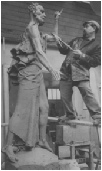
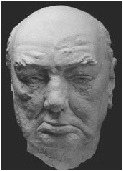
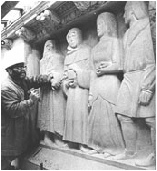
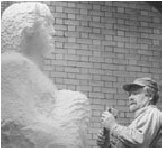
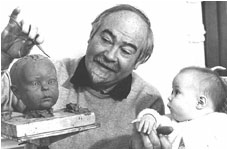
1974/2 Sir George Godber GCB, DM, FRCP, FRCOG, DPH
Presented to the Royal College of Physicians by Fellows & Collegiate Members in recognition of Sir George's services as Chief Medical Officer from 1960 to 1973
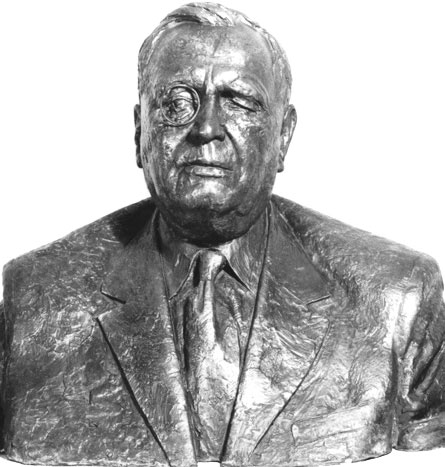
Height 21¼"
Bronze bust (incised on the back, bottom left: McFall 1974)
Modelled in 6 sittings between 4/1/1974 and 23/1/1974
References:
RCP "Portraits" Catalogue II publ 1977 pages 120/121; Annals 25/7/74 Doc 17a. "Comitia was also asked to receive a bust of Sir George Godber by David McFall presented to the College by Fellows & Collegiate Members in recognition of Sir George's services as Chief Medical Officer from 1960 to 1973."
The Guardian 26/11/73: "Sir George Godber retires this week as professional head of the National Health Service.... Sir George is leaving the NHS, which he helped to plan and introduce 25 years ago, ..." (photograph of Sir George page 13) "...His favourite memory is of a bald prisoner who persuaded the hospital psychiatrist that he needed a wig on the NHS. The man escaped the day after getting his new disguise..."

Sir George Godber pursued a distinguished career in health planning and education, and was closely involved in the establishment of the National Health Service. After training at the London Hospital and the London School of Hygiene, he became a Medical Officer at the Ministry of Health in 1939. According to an interview with Anthony Seldon, Godber wanted to work in medicine but did not want to take fees from patients. As he felt certain that there would be a National Health Service, he entered public health medicine in order to get into the MoH which, he presumed, would have the task of organising the NHS. In the early 1940s Godber undertook a survey of hospitals in the Sheffield and Midlands area as part of a series of MoH regional hospital surveys. This work brought him to the heart of the re-organisation of the hospital side of the future health service. In 1950 he became Deputy Chief Medical Officer, MoH, and from 1960 to 1973 he was Chief Medical Officer at the MoH's successor departments, the Department of Health and Social Security, the Department of Education and Science, and the Home Office. Godber was Chairman of the Health Education Council from 1977 to 1978, and became a Fellow of many organisations, including the American Hospital Association and the American Public Health Association. He was appointed Knight Commander Order of the Bath in 1962, and Knight Grand Cross of the Bath in 1971. He married Norma Hathorne Rainey in 1935.
Born in Bedford in 1908 and educated at Bedford School and New College, Oxford, where he rowed for the University, George Godber qualified in medicine from the London Hospital and added shortly afterwards a diploma in public health. In 1939 he joined the staff of the Ministry of Health, and by 1960 had risen to the top as Chief Medical Officer. A dedicated believer in the National Health Service, he has fought courageously to defend its ideals against the opposing pressures of doctrinaire politicians, of both main parties, and of no less doctrinaire doctors. Sir George retired in 1973 but continues to ride fearlessly to the crusades, in loyalty to the Health Service, and against two old public health adversaries, venereal disease and smoking. He looks to the day when society will reject promiscuity, and make smoking a socially unacceptable habit. In recognition of the value to public health of his influential leadership, he was awarded the gold medal in Therapeutics of the Society of Apothecaries in 1973, and he is an Honorary Fellow of the Royal Society of Medicine.
A quiet man - unless roused - it was characteristic of him that at his retirement party there was no smoking, no alcohol, no speeches
100-year-old who helped found the NHS still hardly needs it - 8 August 2008 By Sally Murrer

On his 100th birthday, former Bedford schoolboy Sir George Godber could be described as a living testimonial to the NHS, which he helped Nye Bevan to found 60 years ago. But, though the distinguished and remarkably youthful-looking former doctor still believes passionately in the 'free service for all' NHS principle, he rarely takes advantage of it personally – simply because he is so healthy. Celebrating his birthday on Monday, August 4, Sir George's only burden to the NHS budget is a prescription of cheap calcium pills and occasional optical work when he loses his trusty monocle. The monocle was the subject of a minor disagreement with Nye Bevan himself, whom Sir George described as "a good minister of health; a reformative fellow". Sir George's son Colin Godber said: "Dad lost an eye in a childhood accident and has worn a glass one ever since. "He and Nye were discussing eye tests and dad questioned why people could have free glasses but he couldn't have a free monocle." When Nye gave a non-committal reply, Sir George promptly fished out his glass eye and announced: "But you gave me this on the NHS." Another victory came over cigarette smoking, for which Sir George pioneered the health risks in the 1950s, despite the Government's revenue-induced refusal to accept medical evidence of the day. In the 1960s Sir George took another campaigning stand to ensure contraceptive pills were prescribed free of charge. He joined the Ministry of Health in 1939 and was tasked with inspecting wartime emergency medical services before the NHS was set up in 1948. The self-confessed workaholic who married a nurse, Norma, rose rapidly through the ranks to become chief medical officer in 1960, a post he held for 13 years until he retired. One of seven children brought up on a farm in Willington, Sir George believed strongly in keeping fit. He rowed in the Boat Race twice for Oxford, where he studied at New College after leaving Bedford School, and is believed to be the oldest living Blue. Until three years ago he drove his own car, and until he moved into a Milton Keynes care home last year he lived independently. He only recently stopped exercising twice daily on his indoor bike. "I feel antique now," he joked, showing his royal telegram, which bore a rare personal message from the Queen. Sir Godber is still proud of the NHS he helped to set 60 years ago. He said: "I think it does fairly well. "People did not think we were going to get health services converted adequately and we did. Adequate means not as far as one would like but it means it's still useful at the moment."
Obituary from The Times February 12, 2009
Sir George Godber: former Chief Medical Officer

George Godber, a commanding figure whose presence was enhanced by a monocle clamped in his right eye, had by his death become near-legendary. His extreme age — he lived to be over 100 – meant that he was among the last survivors of the generation who founded the National Health Service in 1948. In a service inclined to glorify its past and to disparage the medical services that went before, Godber was listed along with Nye Bevan and William Beveridge as a saviour, almost a saint.
He would have none of it himself. He remained modest, and realistic. In his long retirement he did not cavil publicly with what his successors had done, though he questioned whether the many reorganisations the NHS has been subjected to had outweighed the losses or effected any economies.
On his 100th birthday in August, he declared that the NHS had done fairly well. “People did not think we were going to get health services converted adequately and we did,” he said. “Adequate means not as far as one would like, but it means it’s still useful at the moment.”
George Godber was born one of seven children to a nurseryman, Isaac Godber, who raised tomatoes under glass on a farm at Willington, near Bedford. He was educated at Bedford School and New College Oxford, where he rowed twice for the dark blues in the University Boat Race, losing on both occasions. A lifelong teetotaller, Godber declined the lunchtime pints of beer then prescribed to build up oarsmen, substituting marshmallows instead. Despite this unorthodox diet, he weighed in at a mere 12st 5lb in the 1928 race, stones lighter than a modern Boat Race oarsman.
He trained at the London Hospital and the London School of Hygiene, gaining a diploma in public health in 1936. He worked in various junior posts for the next three years, experiencing a system where many of the poor could not afford to pay for a GP but were too proud to seek free care. He became convinced that a national health service would be created and to participate in its planning he joined the Ministry of Health as a medical officer in 1939.
Among his early tasks was the organisation of maternity services in the suburbs for women evacuated from the cities. In 1942, when Beveridge first outlined the role of healthcare in a future welfare state, Godber took part in a national survey of hospitals, region by region. His patch was Yorkshire and the north Midlands, where he visited and reported on 300 establishments.
The reports of the ten teams for England and Wales and one for Scotland painted a consistent picture. Buildings were old and decaying, services haphazard and inefficiently delivered. But the scale of the reforms needed depended upon political will, which was not provided until the 1945 election brought Labour to power.
Nye Bevan, the Minister of Health, was, said Godber later, “a good minister of health — a reformative fellow”. Bevan pushed through a more radical reform than had been envisaged in the 1944 Health White Paper. Bevan and Godber got on well. One day they were discussing eye tests, and Godber, who had lost an eye in a childhood accident, complained jokingly that while people who needed glasses got them free, he couldn’t have a free monocle. When Bevan made a non-committal reply, Godber fished out his glass eye, declaring: “But you gave me this on the NHS.”
Godber’s early contributions included a plan to distribute consultants more fairly across the NHS, and instigating an inquiry into deaths in childbirth designed to teach lessons without pointing fingers, by anonymising the cases. This continues to this day.
He became Deputy Chief Medical Officer in 1950, and Chief Medical Officer a decade later. These were the days of management by consensus, when everybody who worked in the NHS knew resources were limited, and shared responsibility for rationing them fairly. The advent of professional managers, inevitable as it may have been, altered the balance and created a “them and us” mentality.
He was the first CMO to campaign against smoking, but regretted the unwillingness of successive governments to regulate the promotion of tobacco, alcohol and unhealthy food, or to enforce fluoridation of the water supply — “the simplest and safest of preventive measures”. That battle is still not won.
In his bearing, Godber was the model CMO: patient, understanding, yet forceful when force was needed. He was prepared, as a CMO should be, to stand up to ministers, confident in the evidence at his disposal. He was good at identifying and promoting talented younger people — you do not get tomorrow’s policies by speaking to yesterday’s people, he remarked.
His particular interests included manpower planning, vaccination campaigns against polio and diphtheria, and paediatric care. He and his wife Norma suffered the loss of three of their seven children to a genetically transmitted blood disease, so the importance he placed on family life and the care of children was more than purely professional. He insisted successfully in the 1960s that contraceptive pills be provided on the NHS, free of charge.
On his retirement in 1973 he remained extremely active, playing golf twice a week until he was 90 and continuing to drive a car up to the age of 97. He was the best possible advertisement for the abstemious lifestyle that he followed.
The NHS, he concluded in 1988, was one of the greatest social innovations Britain had produced. “It is imperfect and has often achieved less than one hoped it would. It still does not have inbuilt review of quality,” he said. “It is underfunded and too much focused on reducing costs. Yet it has achieved more for the resources invested in it than any of the other services I know.”
George Godber won many awards and honours. He was appointed CB in 1958, KCB in 1962 and GCB in 1971. He is survived by two sons and a daughter; his wife Norma died in 1999.
Sir George Godber, GCB, Chief Medical Officer 1960-73, was born on August 4, 1908. He died on February 7, 2009, aged 100
Lives remembered: Sir George Godber
Dr David McKinlay writes: Your fine obituary (Feb 12) well summarises George Godber as “modest and realistic”. He often attributed early NHS successes to his predecessor, Wilson Jameson, but he was a major player in the resuscitation of the near moribund general practice in the late 1960s. A great chair and seeker of consensus, he enthused a young GP in a committee of the great and the good by saying “now can we hear a real GP’s views”. An ardent supporter of general practice, in his Pickles lecture of 1985 he said: “British primary care at its best is as good as anywhere, but there is a less efficient tail that is far to long.” With similar foresight in a 1990 letter to me about the Thatcher reforms (fundholding etc.), he wrote: “Those who provide the best service should profit thereby, but turning the NHS into a medical Woolworths will debase the currency”. How prescient.
Eric Callway writes: I was posted to the UK Mission in Geneva as a Second Secretary in 1973. Among my duties was to provide a link between the visiting UK delegation to the World Health Assembly (WHA), held annually in Geneva by the WHO, and the Foreign Office on “political” questions that might be debated at the assembly. The leader of the delegation was the Chief Medical Officer, Sir George Godber. It was his last, and my first, WHA. Apart from the perennial resolutions on aspects of the Palestinian question, the most delicate “political” issue for the UK, as new members of the then EEC, was how to react to a resolution sponsored by Australia, a fellow Commonwealth member, attacking our European partner, France, for testing nuclear bombs in the Pacific. I sought FCO guidance and was told to instruct Sir George not to support the Australian resolution. He should either vote against or abstain. One did not “instruct” Sir George. He was an institution in the Department of Health and, incidentally, had a brother who was a minister. I merely advised him what the FCO had said. He took my advice in good humour. He summed up his voting intentions very succinctly, “This is the World Health Assembly. Nuclear bombs are unhealthy.” He voted for the Australian resolution objecting to the French tests.
James F. Barnes writes: Sir George Godber was a regular visitor to Washington D C during my time as science and technology counsellor in the British Embassy from 1972 to 1974. At that time the United States was not represented on the Council of the World Health Organisation and one of the main purposes of these visits was to ensure that financial support would continue following the appointment of a new director of the WHO. Sir George would arrive at Dulles Airport on a Sunday afternoon and I would take him to the small hotel he always used in downtown Washington. On the Monday morning I would accompany him to the Department of Health Education and Welfare. Invariably there would be a private meeting with the Surgeon General. Then he would have a cup of tea and be taken back to Dulles. After an overnight flight, he would be back at his desk in London on the Tuesday morning. On one occasion I asked him, “George, how do you do it?” He replied, “I don’t smoke, I don’t drink, and I eat very little. In that way I can avoid jet lag.”
Dr Bernard Dixon writes: More than 30 years ago I attended, as editor of New Scientist, a private lunch arranged by the parent company, IPC, to discuss plans for a new popular health magazine. IPC, whose stable of periodicals ranged from Titbits to Horse and Hound and Country Life, appeared keen to promote healthier lifestyles, and this was to be its first venture. During the meal, when ideas both sound and silly were batted around, Sir George (obituary, Feb 12) said very little. Eventually, the host turned to him and asked for his views, which he delivered with his characteristic blend of courtesy and authority. “Well, I am always very willing to help with any initiative to encourage healthy living,” George said, “and this has been a splendid occasion. Thank you so much for inviting me. But you don’t really want to launch yet another magazine, do you? After all, there are far too many already. On the other hand, if you are determined in your objectives, then I would strongly urge you instead to impose a total ban on tobacco advertising in all of your existing magazines.” Lunch broke up shortly afterwards. The health magazine never appeared.
Professor Hugh Freeman writes: When a registrar at the Maudsley Hospital, I was surprised to receive a letter from the Ministry of Health, signed by the Deputy Chief Medical Officer, asking for a reprint of my paper in The Lancet describing an innovative mental health service in Oldham. Afterwards, there were many other indications by Sir George of kind interest in my work, which were very encouraging to a young consultant, far from the centres of power and influence in medicine. Unlike his predecessors, the new Chief Medical Officer took a close personal interest in the psychiatric services. Later, as editor of The British Journal of Psychiatry, I interviewed him after his retirement and concluded that he had played an essential part in the decision to change the whole basis of mental healthcare away from mental hospitals, though he himself never made any such claim. In every sense, Sir George was a towering figure. He was totally committed to the NHS as a free, universal and publicly provided service. After Aneurin Bevan, I believe his was the most important influence in the creation of a national health system out of the chaos that existed before it. What he must have felt about the creeping privatisation and commercialisation of recent years is not hard to imagine.
All rights reserved
| Animals |
| Busts and Heads |
| Children |
| Churchill studies |
| Lettering |
| Medals coins plates |
| Reliefs |
| Stone carvings |
| Contemporary British Artists |
| On Epstein |
| Picasso |
| The art of portrait sculpture |
| Letters |
| Palliser |
| Son of Man |
| Press |
| Obituaries |
| Memorial address |